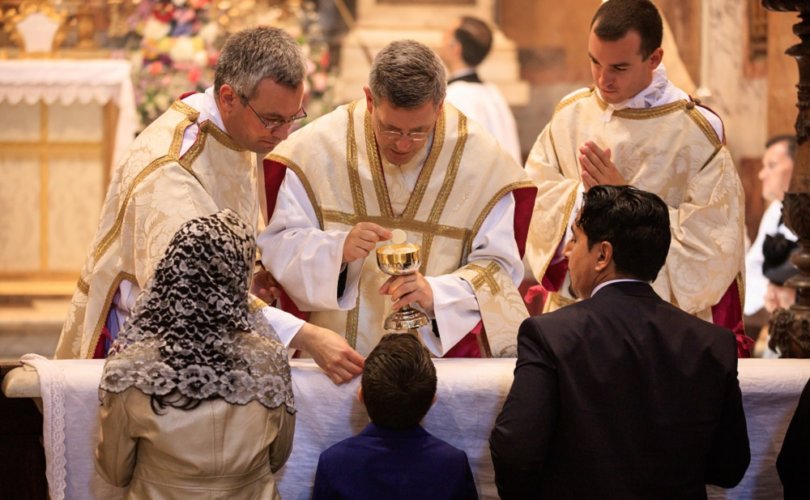PETITION: Urge U.S. Catholic Bishops Conference to defend Catholic heritage and statues! Sign the petition here.
September 21, 2020 (LifeSiteNews) – A group of German medical doctors has written a statement to the German Bishops' Conference in which they say that there are “no medical reasons for a ban of Communion on the tongue,” according to a press release obtained by LifeSiteNews.
The document is written by “physicians from different regions and with different medical specialties,” one of the organizers of the document told LifeSite. The initiative was taken, according to the speaker who wishes to remain anonymous, “because we in Germany thought that, after the lifting of the ban on Communion on the tongue in Austria, this would be allowed again after a short delay also in our country. But since this was not even the case after weeks, we started this initiative.”
In June, 21 Austrian doctors quoted the professional opinion of Professor Filippo Maria Boscia, the president of the Association of Catholic Doctors of Italy who stated in May that “Communion on the tongue is safer than hand Communion.”
In light of the coronavirus crisis, the German bishops banned Communion on the tongue. That ban is still in effect. Thus, faithful are forced to receive Holy Communion on the hand. The German bishops will have their annual fall assembly September 22 to 24, for which this new statement has been prepared.
The German Catholic newspaper Die Tagespost, which first reported on this new initiative on September 17, explains more in detail what the arguments of this group of medical doctors are.
According to this newspaper, the medical doctors rely, among others, on the work of the Munich virologist Michael Roggendorf who works in the field of coronavirus crisis intervention.
According to these physicians, the hands of communicants in the churches are also carriers of viruses and bacteria since they touch the pews when sitting and kneeling. Therefore, the reception of Holy Communion in the hand “cannot be regarded as a safe [hygienic] alternative,” states the Tagespost report.
If during the distribution of Holy Communion, the priest should touch one of the communicants' tongues, he can disinfect his hands. In addition, when opening one's mouth, one tends to breathe in, rather than out, so that the dispersion of droplets is not so probable. Thus, the report explains, Communion on the tongue is safer than Communion on the hand, also since the kneeling position for Communion on the tongue creates a safer distance between the priest and the communicants.
Further summing up the arguments of the 27 medical doctors in favor of Communion on the tongue, the Tagespost report says that the traditional rite of Holy Mass includes a strict procedure of the cleansing of the hands which is part of the Mass. That is to say, the cleanliness of the priest does not depend upon his own whims, but is, instead, part of the rite of the Mass. Only the priest is allowed to touch the chalice and the paten and ciborium. In addition, the priest celebrating the Traditional Latin Mass is not even touching anything anymore with his thumb and pointer – which remain pressed upon each other – after consecration, thus keeping these two fingers especially clean.
Furthermore, the medical doctors also point out that Switzerland never put a ban on Communion on the tongue and never experienced a spike in infections due to the practice of Communion on the tongue.
With regard to other illnesses, such as the flu and meningococcal infections, the doctors state that there is a low risk of infection.
As a September 19 press release of the group of medical doctors states, the German Bishops Conference will decide during their upcoming fall assembly whether to “lift the ban on Communion on the tongue.” With it, they follow their colleagues in Austria, who had had a similar initiative already on the Feast of Corpus Christi, in June of this year and in the wake of which the “Austrian Bishops' Conference has lifted the ban on Communion on the tongue.”
These German physicians hope that “with their intervention, there will be an end to the conflict of conscience among many faithful and priests and the canoncially ordinary form of reception of Communion will no longer be denied.”
According to the press release, other doctors have already now joined the original group of signatories.
This group of doctors asks why the German bishops do not join the Austrian and the Swiss bishops who permit Communion on the tongue and conclude their press release with the words: “Why should the German bishops exit this community [of the German-speaking realm] and take a Sonderweg [an exceptional, independent path]?”
The pro-family organization Voice of the Family, together with LifeSiteNews, hosted an online conference in July stressing the importance of receiving Holy Communion worthily, that is: kneeling and on the tongue. One of its speakers, LifeSite contributor Dr. Peter Kwasniewski, insisted that a bishop oversteps his authority in denying Catholics the right to receive Holy Communion on the tongue. “Many bishops are abusing their authority right now because … they’re supposed to uphold Canon Law and Canon Law is really clear that the faithful have the right to receive communion on the tongue. That's it,” he stated.



